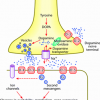Sunifiram's primary action is to activate NMDAr; it has no brakes. This action is associated with numerous very harmful neurological diseases caused by excitotoxicity. This logic should be sufficient to avoid sunifiram use.
Actually sunifiram acts on the
glycine binding site of NMDA receptors. This is by no means the same as direct NMDA activation: at the very least the glutamate binding site needs to be simultaneously activated for the ion channel to open. Therefore there is at least one obvious brake, and that is the concentration of glutamate available at the receptor site.
These mechanisms of action are almost identical to those of nefiracetam without the potentially toxic metabolites. Lots of other drugs – including some very interesting ones in commercial development such as
GLYX-13 – act via the glycine binding site of NMDAr, which is an essential site for the mediation of Long Term Potentiation and hence for the enhancement of memory and learning. It is disingenuous to claim that such agonism is automatically neurotoxic.
Numerous people have been taking sunifiram regularly without negative side effects of this order. If it were neurotoxic, then given the number of people on this board and elsewhere who have taken / are taking sunifiram (sometimes in frighteningly large doses), why are we not seeing numerous cases of hospitalizations due to excitotoxic symptoms or reports of glutaminergic storms?
Injected doses of 1mg/Kg of body weight in mice failed to show any toxic symptoms. Multiple
scientific studies in animals, as opposed to two or three
anecdotal forum reports in humans, show sunifiram at high doses to have no known neurotoxic effects in said animals. Those anecdotal reports need to be weighed against the many anecdotal reports claiming positive effects on motivation, attention, memory, sociability, etc., especially when co-administered with with a high-quality choline source.
Having said that, it is wise to avoid mixing sunifiram with stimulants, expecially high doses of caffeine, amphetamines, etc. On its own (plus choline supplementation) in doses of ~5-10mg per day it appears to be safe over the short term and over the medium term (in my case, up to three months continuous usage, with breaks at weekends, although I have not taken it continuously, as opposed to sporadically, for several months now).




















































